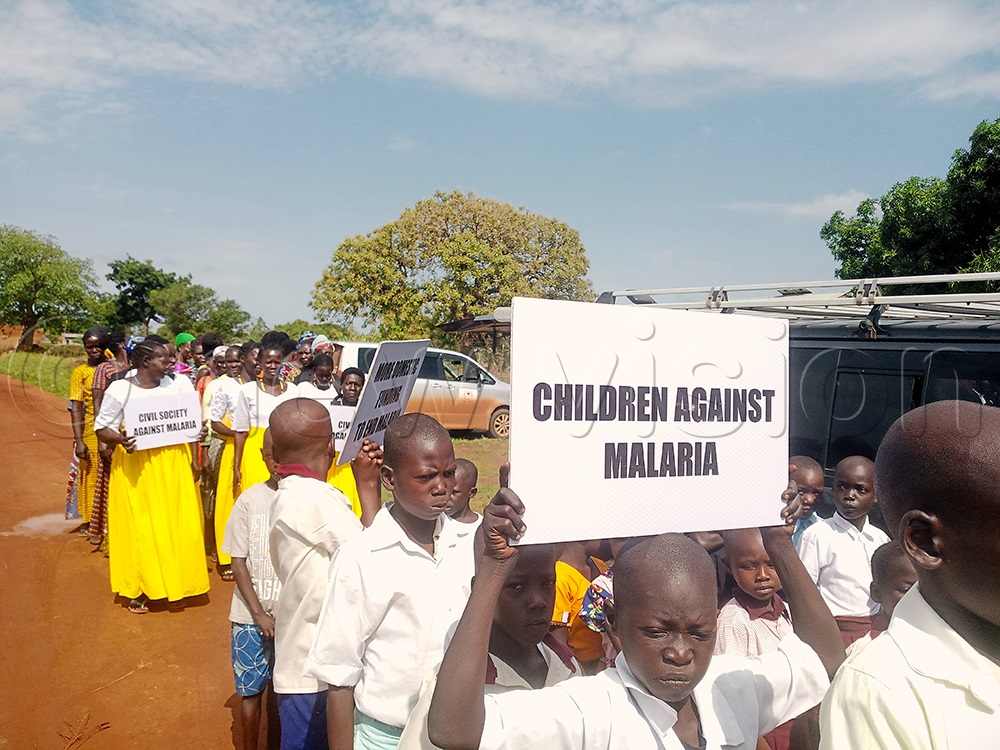Gulu Archbishop calls for govt support in malaria fight
"Hygiene must be prioritised by the community, and awareness campaigns are crucial to educate people about prevention methods," stated Archbishop Wokorach. He further emphasised, "This requires effective planning and strong commitment."
(L-R) Santa Okot Woman MP Aruu North, walking with Rwot John Peko Lugayi II of Pajule, and Archbishop Raphael Wokorach PiMony of the Archdiocese of Gulu Archdiocese. (Credit: Claude Omona)
By Claude Omona
Journalists @New Vision
PADER - Archbishop Raphael P'Mony Wokorach of Gulu Archdiocese has appealed to the government to provide essential support in combating malaria in Pader district.
Archbishop Wokorach served as the chief guest at the Third Malaria Walk, an event organised to raise malaria awareness in Pader district.
The walk, themed "No One Should Die of Malaria", took place on March 29, 2025, in Bongtiko sub-county, Pader district. It was organised by the Pimar Charity Foundation Uganda, in collaboration with the Uganda Parliamentary Forum on Malaria and the Government of Uganda.
According to the Ministry of Health, Pader district ranks among the top three districts in Uganda with the highest malaria rates. Archbishop Wokorach urged the government to allocate the necessary resources to support the people of Pader district and reduce these alarming figures.
"Hygiene must be prioritised by the community, and awareness campaigns are crucial to educate people about prevention methods," stated Archbishop Wokorach. He further emphasised, "This requires effective planning and strong commitment."
Santa Okot, the Woman MP for Aruu Constituency in Agago district and a member of the Parliament's Committee on Malaria, noted that Parliament has been organising the Malaria Walk since 2021. Okot attributed the high poverty levels in her constituency to the prevalence of malaria.
"Ministry of Health surveys indicate that 30 children die from malaria daily, translating to 900 deaths per month," Okot reported. She stressed the importance of continuous community awareness campaigns.
Bongtiko sub-county has a population of 17,000. Records from Lawire Health Centre II show that between July 2024 and March 2025, 655 out of 1,291 male patients tested positive for malaria. Similarly, 1,309 out of 3,123 female patients tested positive.
Children and other community members carrying placards during the regional Malaria Walk in Pader district. (Credit: Claude Omona)
Dennis Okidi Opira, representing the Pader district health officer, confirmed that Pader is among the three districts with the highest malaria prevalence. He reported that 54 percent of patients tested in Pader district are diagnosed with malaria.
Pader district also faces a severe shortage of healthcare staff, with only 27% of required positions filled. This leaves many health centres understaffed.
Kilama Godfrey, the LCIII chairman of Bongtiko sub-county, urged the government to upgrade Lawire Health Centre II to a health centre IV to improve services and staffing.
Bongtiko sub-county has over 90 village health teams (VHTs) supporting the community. Hassan Onekalit, a VHT from Kworo East, reported that they have not received malaria drugs and testing kits from the government since August 2024.
He stated that he refers 10 to 11 children from his area, which includes 25 households with 41 children aged 2 to 5, to the health centre weekly.
Bosco Anywar, a VHT from Omogi parish, Bongtiko sub-county, attributed the high malaria rates to parents' delays in seeking medical intervention. Ajok Joyce, a VHT from Jaka cell, Bongtiko sub-county, added that many community members do not complete their prescribed treatment and instead share medications with sick relatives.
Regional Malaria Walks are being held to combat Uganda's high malaria rates, which significantly impact health services.
Despite existing prevention efforts, malaria remains a major problem, prompting both regional and international solidarity events.